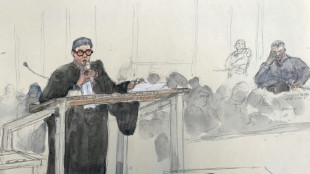
-
 'Retaliate': Trump tariff talk spurs global jitters, preparations
'Retaliate': Trump tariff talk spurs global jitters, preparations
-
'Anti-woke' Americans hail death of DEI as another domino topples

-
 Trump hails migration talks with Mexico president
Trump hails migration talks with Mexico president
-
Truckers strike accusing Wagner of driver death in Central African Republic

-
 London police say 90 victims identified in new Al-Fayed probe
London police say 90 victims identified in new Al-Fayed probe
-
Air pollution from fires linked to 1.5 million deaths a year

-
 Latham falls for 47 as New Zealand 104-2 in first England Test
Latham falls for 47 as New Zealand 104-2 in first England Test
-
US tells Ukraine to lower conscription age to 18

-
 Judge denies Sean Combs bail: court order
Judge denies Sean Combs bail: court order
-
Suarez extends Inter Miami stay with new deal

-
 Perfect Liverpool on top of Champions League, Dortmund also among winners
Perfect Liverpool on top of Champions League, Dortmund also among winners
-
Liverpool more 'up for it' than beaten Madrid, concedes Bellingham

-
 Aston Villa denied late winner against Juventus
Aston Villa denied late winner against Juventus
-
Mexico president hails 'excellent' Trump talks after US tariff threat

-
 Leicester set to appoint Van Nistelrooy - reports
Leicester set to appoint Van Nistelrooy - reports
-
Coffee price heats up on tight Brazil crop fears

-
 Maeda salvages Celtic draw against Club Brugge
Maeda salvages Celtic draw against Club Brugge
-
Villa denied late winner against Juventus

-
 Dortmund beat Zagreb to climb into Champions League top four
Dortmund beat Zagreb to climb into Champions League top four
-
Mbappe misses penalty as Liverpool exact revenge on Real Madrid

-
 Brazil's top court takes on regulation of social media
Brazil's top court takes on regulation of social media
-
Thousands still queuing to vote after Namibia polls close

-
 Trump taps retired general for key Ukraine conflict role
Trump taps retired general for key Ukraine conflict role
-
Canadian fund drops bid for Spanish pharma firm Grifols

-
 Argentine ex-president Fernandez gives statement in corruption case
Argentine ex-president Fernandez gives statement in corruption case
-
Mexico says Trump tariffs would cost 400,000 US jobs

-
 Car-centric Saudi to open first part of Riyadh Metro
Car-centric Saudi to open first part of Riyadh Metro
-
Brussels, not Paris, will decide EU-Mercosur trade deal: Lula

-
 Faeces, vomit offer clues to how dinosaurs rose to rule Earth
Faeces, vomit offer clues to how dinosaurs rose to rule Earth
-
Ruby slippers from 'The Wizard of Oz' up for auction

-
 Spain factory explosion kills three, injures seven
Spain factory explosion kills three, injures seven
-
US Fed's favored inflation gauge ticks up in October

-
 Defence lawyers plead to judges in French mass rape trial
Defence lawyers plead to judges in French mass rape trial
-
US says China releases three 'wrongfully detained' Americans

-
 New clashes in Mozambique as two reported killed
New clashes in Mozambique as two reported killed
-
Romania officials to meet over 'cyber risks' to elections

-
 Chelsea visit next stop in Heidenheim's 'unthinkable' rise
Chelsea visit next stop in Heidenheim's 'unthinkable' rise
-
Former England prop Marler announces retirement from rugby

-
 Kumara gives Sri Lanka edge on rain-hit day against South Africa
Kumara gives Sri Lanka edge on rain-hit day against South Africa
-
Namibia votes with ruling party facing toughest race yet

-
 Spurs goalkeeper Vicario out for 'months' with broken ankle
Spurs goalkeeper Vicario out for 'months' with broken ankle
-
Moscow expels German journalists, Berlin denies closing Russia TV bureau

-
 Spain govt defends flood response and offers new aid
Spain govt defends flood response and offers new aid
-
France says Netanyahu has 'immunity' from ICC warrants

-
 Nigerian state visit signals shift in France's Africa strategy
Nigerian state visit signals shift in France's Africa strategy
-
Stock markets waver as traders weigh Trump tariffs, inflation

-
 Tens of thousands in Lebanon head home as Israel-Hezbollah truce takes hold
Tens of thousands in Lebanon head home as Israel-Hezbollah truce takes hold
-
Opposition candidates killed in Tanzania local election

-
 Amorim eyes victory in first Man Utd home game to kickstart new era
Amorim eyes victory in first Man Utd home game to kickstart new era
-
Fresh fury as Mozambique police mow down protester


Drug-resistant superbugs: Ukraine's other wartime enemy
Ukrainian soldier Anton Sushko, severely wounded, thought he was finally safe when he spotted a rescue team after crawling for hours through the battlefield in eastern Ukraine.
"That's it, I thought, here are the guys... We made it. Wounded, but alive," the 40-year-old recalled from his hospital bed in Dnipro, southeastern Ukraine.
But Sushko wasn't out of danger yet.
By the time he escaped, a wound on his left leg had got infected with aggressive bacteria resistant to antibiotics, making it harder for doctors to treat him.
Thousands of other soldiers have, like him, come back from the front with wounds festering with multidrug resistant organisms, pointing to a little-understood cost of the war.
Bacteria have long developed resistance against medicines designed to fight them, rendering many drugs useless.
The process known as antimicrobial resistance (AMR) directly causes over a million deaths and contributes to five million deaths every year, according to the World Health Organization.
This has been accelerated by the massive use of antibiotics to treat humans, animals and food, including in Ukraine.
But Ukraine has seen a particular increase in antimicrobial resistance during the Russian invasion, according to WHO representative in Ukraine, Jarno Habicht.
"The ultimate cause why we see the rise of antimicrobial resistance is actually the ongoing war," he said.
- 'Dirty, rotting' -
Direct combat and aerial strikes have triggered a rise in patients suffering from traumatic wounds, who have overwhelmed understaffed hospitals.
The Dnipro Mechnikov Hospital, where soldier Sushko was being treated, saw its workload increase tenfold, said chief surgeon Sergiy Kosulnykov.
"Every blast is an open wound, and every open wound is an infection," Kosulnykov said, showing AFP slides of purulent lesions.
Explosive battlefield injuries rarely get treated in time as evacuations from the drone-infested front lines have become increasingly perilous.
By the time medical teams take a look, the wounds are often "dirty, rotting, with necrosed (dead) tissues and bones, and full of aggressive microbes that are difficult to fight," Kosulnykov said.
To save their patients' lives, teams often have no choice but to prescribe strong antibiotics.
And they rarely have time to wait for laboratory results determining the right antibiotics.
"It's impossible to imagine all of that without a growth in resistance," said Kosulnykov.
"The more we try to somehow kill a microbe, the more it defends itself."
The process sends doctors on a quest for ever stronger antibiotics to save the lives of patients, who cannot do much but hope a cure works.
- 'Not in vain' -
As he waited, Sushko tried to find sense to it all.
"I distract myself with music, I read literature to go deeper into the roots of our people, for my soul to grasp that our guys aren't giving their lives in vain," he said.
Racing to save his patients, Kosulnykov lamented the lack of tools and modern medication plaguing his department.
But he said that the hospital usually managed to procure the right medication when soldiers' lives hung in the balance.
Many uncertainties still remained.
One in particular puzzled Kosulnykov.
He estimated around 50 percent of wounded soldiers admitted in his service had developed antimicrobial resistance even before starting treatment.
"We ask 'Has he been in hospital before? Somewhere else?'," Kosulnykov recalled a frequent question.
"They come straight from the battlefield... This is incomprehensible. We simply don't understand," he said.
Ukraine has long been known for high AMR rates compared to most European countries, because antibiotics were until recently accessible without prescription.
The surgeon also suggested that static trench warfare, similar to World War I, may contribute to the rise in AMR.
- 'No complete victory' -
"We need to better study the root causes of antimicrobial resistance" as the war continues, said WHO's Habicht.
Part of that research relies on monitoring, said Habicht, who added Ukraine had increased the number of laboratories monitoring drug-resistant bacteria to 100, compared to three in 2017.
The US Centers for Disease Control and Prevention, the public health agency, found that "aggressive bacteria is now spreading beyond Ukraine's borders".
Habicht however refused to give into fearmongering.
He emphasised the need for the war to end, as well as for monitoring and research to ensure appropriate treatment.
"We don't want to go back to the era where we cannot treat certain diseases," Habicht said.
Three weeks after AFP visited the hospital, Sushko went back home, his infection under control.
The hospital's team values any success, but Kosulnykov remained level-headed.
"People fought infections before me, and they will fight infections after me. There are some local victories, but there will be no complete victory."
J.Bergmann--BTB
